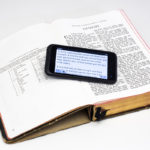- The Explore the Bible lesson for Feb. 14 focuses on Luke 6:1-11.
Jeff Robinson, pastor of Christ Fellowship Baptist Church in Louisville, Kentucky, imagines the following scenario:
What if your church’s elders passed down a fiat that members could not take more than 1,999 steps on the Lord’s Day without facing church discipline? One more step would be too closely akin to taking a long trip and that is a no-no on the day God set aside for worship.
What if they forbid you to carry your Bibles to church because such heavy lifting would too closely resemble work? Anything heavier than a dried fig is strictly taboo on this day, they say.
Or, what if they added a clause in the constitution and bylaws that members must not leave a radish in salt because that vegetable might become a pickle and pickle-making is work, which is, of course, forbidden on this day.
And, they added sub-paragraphs to the constitution that prescribed disciplinary action for those found guilty of other activities on the Lord’s Day such as carrying a pen (lest you be tempted to write with it), carrying a needle (lest you be tempted to sew with it), helping those who are sick but with non-life-threatening maladies (it can wait till Monday), looking in the mirror, spitting, removing dirt from clothes. You get the picture.
What Robinson is exposing is the danger of the kind of religious legalism that had its roots in the Judaism of Jesus’ day. The Pharisees had taken the simple commandment to rest on the Sabbath and elaborated it into a complicated and overbearing list of do’s and don’ts.
Letter of the Law or Spirit of the Law?
When Jesus’ disciples dared to pick and eat grain on the Sabbath and when Jesus dared to heal on the Sabbath (Luke 6:1-11), the Pharisees accused them of daring to violate the Sabbath. In Mark’s version of the story, Jesus responds to their accusations by explaining the true purpose of the Sabbath: “The Sabbath was made for man, not man for the Sabbath.” (Mark 2:27-28, NIV). Jesus made it clear that a legalistic “letter of the law” interpretation of the Sabbath was missing the true “spirit of the law” intent of the Sabbath. The Sabbath was meant for a blessing of rest, not for a burden of man-made rules and regulations.
Amazingly, modern day rabbis even speculate as to what kind of toilet can and can’t be flushed on the Sabbath. One rabbi explains:
It goes without saying that flushing a toilet is permitted on Shabbat. There is some discussion, however, whether it is permissible to flush a toilet that is equipped with a disinfectant device that colors the water as it is flushed. It is virtually unanimous among halachic authorities that one should not flush such a toilet on Shabbat. This is because doing so might be a violation of tzoveiah, the prohibition against coloring a substance or item on Shabbat. As such, those who use such devices in their home should remove them before Shabbat.
Sign up for our weekly edition and get all our headlines in your inbox on Thursdays
Not just an ancient Jewish thing
But legalism isn’t confined to the Jewish circles of Jesus’ day, or ours. Legalism can, and does, happen in Christian circles as well. Consider the anti-legalism exhortations from the Apostle Paul in Galatians 1:6-9, Romans 14:1-2 and Colossians 2:20-23.
Jeff Robinson concludes with appropriate words of exhortation for Christians today:
The law left the Pharisees (and their disciples) miserable because they viewed it as a vehicle to glory, a means of salvation. They used it unlawfully and the result was a shrunken, joyless, bitter existence. This is the result when we misinterpret Scripture and replace the grace of God with legalism. But rightly understood, the law of God is good, unmasking our self-righteousness and exposing our depravity. It sends us running for cover in the righteousness of Christ won at Calvary through his selfless love. It liberates us to rest from our labors at keeping the law, and leads us to green pastures of deep and overflowing joy in Christ alone.
Christians today constantly need to be on the look-out for legalism. Don’t replace the grace of God with the bondage of legalism. Instead, let the law of God lead you to that “overflowing joy” that is found in Christ alone.
Jim Lemons is professor of theological studies and leadership at Dallas Baptist University. He is a senior adult Sunday school teacher at Park Cities Baptist Church in Dallas.














We seek to connect God’s story and God’s people around the world. To learn more about God’s story, click here.
Send comments and feedback to Eric Black, our editor. For comments to be published, please specify “letter to the editor.” Maximum length for publication is 300 words.